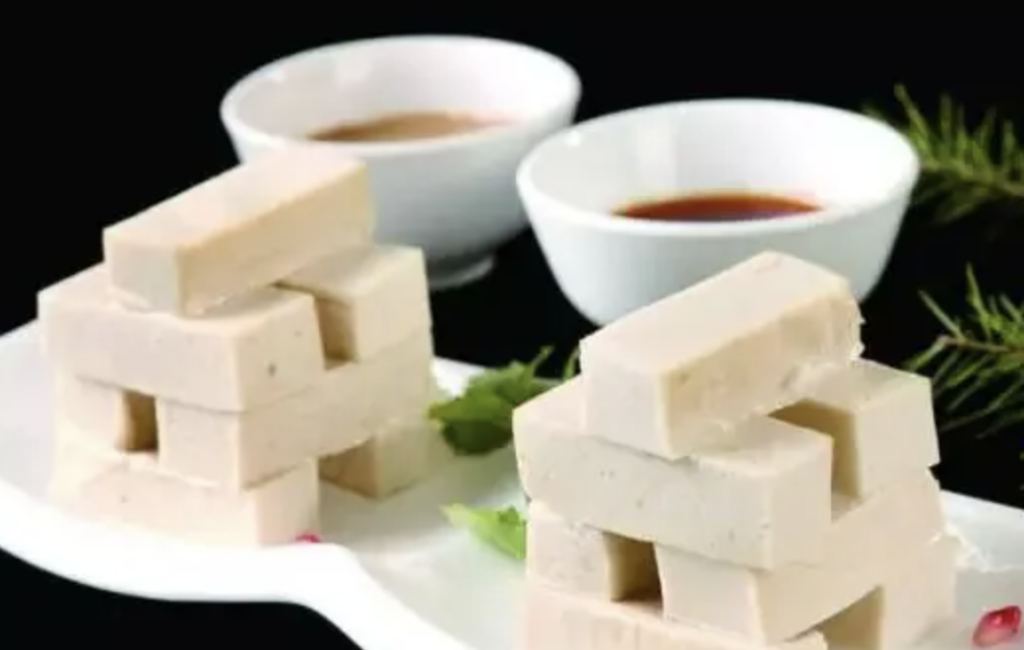Yongning Tofu is a traditional local dish from Beijing. It has been recorded since the Han Dynasty and became a tribute to the imperial court during the Qing Dynasty. It once had a history of every household making tofu. With its unique production process and rich nutritional value, it has been passed down through generations. The soybeans used are sourced from the high-quality, pesticide-free, and chemical-free farms in Yongning. These soybeans, free from pollution and rich in iron, lecithin, fiber, and plant estrogens, combine perfectly with the local water to create tofu that can be described as a divine product.

Chinese Name: Yongning Tofu
Main Ingredient: Soybeans
Preservatives: No
Nutritional Value: Protein, low fat, cholesterol-free
Health Benefits: Clears heat, moisturizes dryness, nourishes blood, and enhances skin beauty
Suitable For: People with a hot constitution, bad breath, and thirst
Production Process: Yongning is surrounded by mountains, with spring water from three sides gathering underground, rich in calcium, iron, magnesium, and other minerals. The mineral content and hardness of the water are ideal for tofu processing. Locals use “sour juice” to curdle the tofu, which results in a smoother and finer texture. The area has developed a tofu banquet to promote tofu consumption. The Yongning Tofu Association was established to unite small tofu producers, standardize production, and enhance market competitiveness.
Yongning has a history of tofu making dating back to the Han Dynasty. The famous saying “From Nanjing to Beijing, you must eat tofu in Yongning” dates back to the Ming Dynasty, and a local proverb describes the tofu as follows: “When raised on the table, it’s yellow, but alive in its texture. When sliced, it’s delicate, and when held in hand, it’s soft. It’s chewy when boiled and light when fried.” This shows how unique Yongning tofu is.
Special Features: Yongning tofu is famous for its excellent taste, thanks to the area’s spring water, high-quality soybeans, and exquisite craftsmanship. The mineral-rich spring water from Yongning’s surrounding mountains is perfect for tofu making, and the region’s unique water is essential for producing its famous tofu.
Tofu, believed to have originated from Liu An, the King of Huainan during the Han Dynasty, has a history of over 2,000 years. It is rich in protein, low in fat, and cholesterol-free, making it a highly nutritious food. It’s no wonder that the Qing Dynasty writer Yuan Mu said, “Tofu is far more delicious than bird’s nest soup.”
Health Benefits of Tofu:
- Boosts Brain Function: Soybeans are rich in phospholipids, which are crucial for brain development. Soybean protein is the essential material for brain activities and can help improve memory and mental capacity.
- Brightens Skin: Soybeans contain plant estrogens, which have similar effects to estrogen but without the side effects. They are considered a healthy agent for youthful and radiant skin.
- Cancer Prevention: Soybeans contain at least five substances known to have anti-cancer properties, including protease inhibitors, inositol hexaphosphate, plant sterols, saponins, and isoflavones. Studies have shown that soy can inhibit cancer cells in various organs.
- Prevents Heart and Vascular Diseases: Soybean saponins lower cholesterol and blood fat, which can help prevent cardiovascular diseases.
- Prevents Hearing Loss: The high iron content in soybeans helps improve blood circulation in the ears, preventing hearing loss.
Yongning Tofu has a long history, dating back to the Han Dynasty, and was once a tribute to the Qing imperial court. With its distinctive craftsmanship and health benefits, it remains a beloved food that is passed down for generations, praised for its role in disease prevention and wellness.
